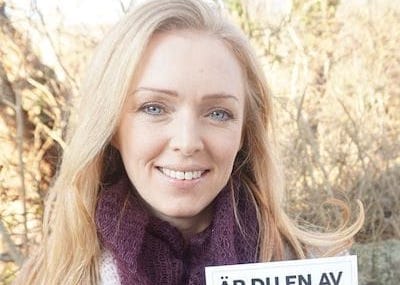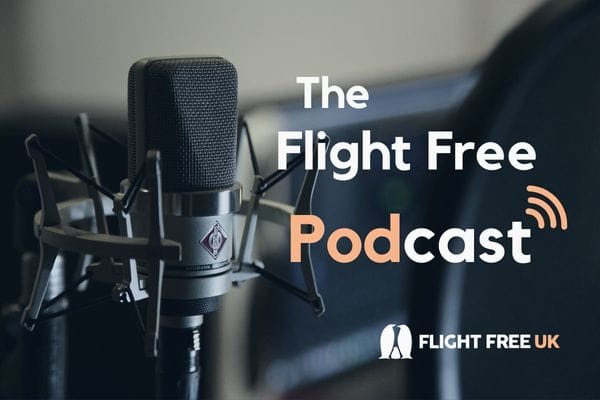Our interview was recorded in a cosy corner of St Stephen's Tavern on Parliament Square, a regular drinking hole for those at Westminster, with a gentle background of clinking cutlery and chatter. A transcript of the interview is below; go to our Podcast page to hear the full interview.
Molly, tell us a bit about your background in environmentalism and politics
I've been in the Green Party for a long time, since I had my first child who is now 31, and I've stood at all levels in all sorts of elections, being elected as MEP for SW England and Gibraltar in 2014.
And you've just signed up for our flight free campaign – thank you! Can you tell us why you've signed, and what the pledge means to you?
Well, I know that aviation is the fastest growing source of CO2 emissions. The figures show that what we’ve done to reduce emissions so far is largely about getting coal out of our electricity generating system, and the main area that’s growing is aviation, and it’s not included properly in our targets.
There seems to be no coordination between what the government is saying about climate change and what it’s doing with aviation policy. So we've got Heathrow expansion, you've got my local airport which is Bristol expanding, and we've got politicians on the one hand say we have a climate emergency, and on the other hand say it’s fine to fly.
"Politicians on the one hand say we have a climate emergency, and on the other hand say it’s fine to fly."
I’ve known for a long time it’s not fine to fly and I've flown only a couple of times in the last decade. It’s important to sign up to this pledge because once you’ve made that decision not to fly, then you look at life in a different way. For example, I get lots of invitations to go to international conferences, and I know I can only do that by video conference, which encourages people to get better video conferencing facilities. It's part of a change in the way you look at life, and it's a change not just 100,000 people need to make, but everybody needs to make if we are to tackle climate change.
Absolutely, we do need to make those changes, but it's difficult because flying is a normal thing to do, it's a part of the way our society works, isn’t it?
Flying has not been a normal part of life for very long, and it’s still not a normal part of many people’s lives. Most flights are taken by the wealthy, and most ordinary people fly once every two years on average. That makes it an equality issue, because rich people are using their flights to trash the climate yet we’ll all pay the price, so it’s a really important commitment in terms of equality that I don’t fly, as well as in terms of climate.
"It's an equality issue, because rich people are using their flights to trash the climate yet we’ll all pay the price."
The problem is that we know we have to tackle climate change but politicians usually shy away from saying that people have to change the way they live. But the alternative is that our children and grandchildren will not have any kind of life at all. And so how difficult can it be, in that context, to make a decision not to fly to Prague for a stag night.
So no, I don't start from a place thinking it's normal to fly – I'm a real headbanger about flying, and I start from a place that says, children being born today have a right to a life, and therefore we should not consider our right to flying to be inviolable when that’s the price that will be paid if we fly whenever we choose to.
You’re a Green Party MEP. What would the Green Party do about this issue?
The Green Party would move against this 'predict and provide' view of aviation: more people want to fly therefore we build more airports, which creates jobs. But that's the wrong way to look at it. We have to do the best for society and for future generations, and for other countries who will also suffer from climate change. So the Green Party has a policy of a frequent flyer levy, where each flight becomes more expensive than the last, so by the time you get to a third flight you basically can't afford it. There could be exemptions for International aid for example, or maybe for cultural exchanges, but very soon you'd find businesses change their business model and stop flying executives off to Dubai. I think you have to use the power of the market to make additional flights very expensive, and that's what a frequent flyer levy would do.
In your work life, you split your time between Bristol and Brussels. How does that work if you don't fly?
I am known as the MEP who doesn't fly! It amazes me that people are astonished that I can operate perfectly OK as an MEP without flying. Every time I put on Twitter that I don't fly, people say, that's only because you won't have to go to Brussels any more [once we leave the EU], or, how many times have you flown as an MEP, like it would be IMPOSSIBLE for me to get to Brussels without flying. [Train travel] is often faster – it’s certainly faster to London because you don’t have the check-in time. I’m going to hop on the Eurostar when we’ve finished recording, and it’s a very comfortable and much pleasanter way to get to Brussels.
"It amazes me that people are astonished that I can operate perfectly OK as an MEP without flying."
I've travelled all across Europe: I've been to Latvia twice by ferry and by train, and Poland, and Lisbon too by train which is a fabulous route. And I've been to Gibraltar twice by train. The Man in Seat Sixty-One is the best source of information. It's a different kind of life – it's an interesting life – you get more time to relax, to enjoy the scenery, and once you've made the decision not to fly, there's a whole new world to explore.
That sounds like a very tempting life! So can you tell us a bit about your involvement with Bristol airport expansion?
The whole idea of Climate Emergency started in Bristol. Bristol has declared a climate emergency and the Mayor supports that, but unbelievably he also supports the expansion of Bristol airport. There's a big campaign to stop the expansion; Extinction Rebellion had an action there recently, we had a die-in at the airport, and other actions are planned. I wrote to the Ontario Teachers’ Pension Plan, who owns the airport, saying I do not think they should be involved in the climate crime of expanding Bristol airport, and also that they should consider whether an airport is the kind of thing that would pay a good return to their pensioners in years to come. I think we should start looking at airports, especially regional airports, as stranded assets and encouraging people to divest from them. The idea of expanding airports and expanding aviation is just totally incompatible with a safe climate in the future.
And what do your constituents say about climate change? Is there enough awareness about it and what should we do about it?
I represent the whole of the South West of England and Gibraltar so as you can imagine there are pretty different views in different parts of the constituency. People in Bristol are very green and quite aware of the fact that flying is a big contributor to climate change, and generally they're very wised up about climate issues.
My main criticism of the government is that it is sending completely mixed messages to people. This is the greatest crisis facing us as a human race and they will admit that and at the same time carry on with all the same policies encouraging consumption, road building, more flights and so on. That actually leaves people in a very bad place psychologically.
What we need from government is clear leadership on the sort of lifestyle we should be following, and following through on that in terms of an economic transition to a sustainable future. As a green economist that's what my work is all about.
We could have much happier lives with far less energy use, but we need the political will and the political leadership to get us there.
Molly's interview is the first in our Podcast series. Hear the full interview and find other episodes here.

